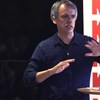stack

Framtider: De bortglömda etiska problemen med självkörande bilar
Hur och med vem ska en självkörande bil krocka om en krock är oundviklig? Hur ska den välja mellan låt säga en fotgängare och en cyklist? Och vem ska hållas ansvarig när krocken inträffat? De här är d

Bortom välfärdschauvinism och nyliberalism med Will Kymlicka
Föreläsning av professorn Will Kymlicka och efterföljande samtal mellan Gina Gustavsson, Anders Lindberg och Enna Gerin. Samarrangemang av Katalys, ABF och Institutet för framtidsstudier. Will Kymlick

Reducing populations' vulnerabilities to mis-disinformation related to scientific content
The purpose of this project is to develop evidence-based strategies to address populations’ vulnerabilities to scientific mis-disinformation.
From Categories to Categorization: A Social Perspective on Market Categorization
Research in the Sociology of Organizations, Volume 51, 2017 Abstract The popularity of research into categories has grown in recent decades and shows no sign of abating. This introductory article takes
Rod Rhodes: The theory and practice of governance: the next steps
Rod Rhodes is Professor of Government (Research) within Social Sciences at the University of Southampton.ABSTRACTIn the 2000s, the New Public Governance (NPG) became prominent and this article takes s
CUSP: Controlling Corruption. The Social Contract Approach
Welcome to the first lecture in the new series CUSP - Critically Urgent Societal Problems - that we arrange in collaboration with the Swedish Collegium for Advanced Study (SCAS) in Uppsala. At this first
Multistakeholder Partnerships for Sustainable Development: Promises and Pitfalls
Annual Review of Environment and Resources, vol. 49 Abstract This review examines the promises and pitfalls of multistakeholder partnerships (MSPs) for sustainable development. We take stock of the lite
Children of austerity
Nearly ten years after the first financial chock Waves rippled through the world economy, generating a global recenssion, the track record of high income countries in protecting Children from its worsoch .
Karin Bäckstrand: The Role of Non-state Actors in Global Climate Governance after COP22 in Marrakech
Professor in Environmental Social Science, Stockholm University ABSTRACTWhat is the roles of non-state actors, such as civil society, business, indigenous movements and cities, in global climate and th Conference of the Parties (COP15) in Copenhagen to COP22 in Marrakech, where Marrakech Global Climate Action was launched involving voluntary climate action commitments from more than 12 000 companies, investors, cities and regions, and civil society actors. Over this timeframe, we have seen a form of ‘hybrid multilateralism’ emerge, in which UN climate diplomacy blurs state and non-state participation in complex and intriguing ways with implications for the authority, legitimacy, and effectiveness of climate governance. This speaks, in different ways, to the transformed landscape of climate cooperation with a strengthened interface of multilateral climate diplomacy and non-state climate action and the potential roles, modes, and effects of non-state actors in the post-Paris period.
Erik Olin Wright: Pathways to a Cooperative Market Economy
Erik Olin Wright: Professor, Department of Sociology, University of Madison-Wisconsin. ABSTRACT The idea that there is a pathway from a capitalist economy to a cooperative market economy is grounded in








